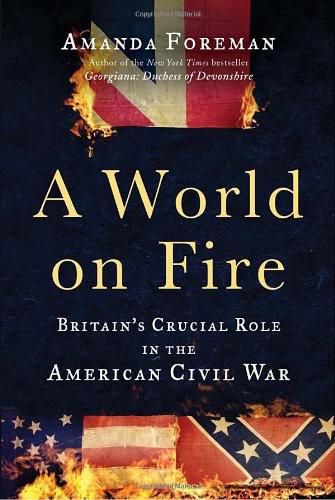
A World on Fire
Britain's Crucial Role in the American Civil War
کتاب های مرتبط
- اطلاعات
- نقد و بررسی
- دیدگاه کاربران
نقد و بررسی

Starred review from April 11, 2011
In a dramatic change of pace, Foreman, author of the bestselling Georgiana, Duchess of Devonshire, fulfills her goal of capturing "the many relationships that together formed the British-American experience during the Civil War," from diplomatic maneuvers on both sides of the Atlantic to the sagas of British volunteers in the Union and Confederate armies. Weaving eyewitness accounts into an overview of the war's progress is tricky, particularly since Foreman includes vivid personality sketches of a very large cast of characters. But her massive text slowly comes into focus as we get to know such British participants as Illustrated London News correspondent Frank Vizetelly, whose wartime drawings are the book's visual highlight, and feisty Americans abroad, like Confederate propagandist Henry Hotze, whose masterful manipulation of the English press helped win the South sympathizers in a country where detestation of slavery was nearly universal. The North, meanwhile, struggled to repair relations after the 1861 seizure of two Confederate agents from a British ship. Whether Britain's role in the Civil War was "crucial" remains debatable, but Foreman amply offers a new perspective on the war in an elegantly written work of old-fashioned narrative history. 32 pages of b&w photos; photos throughout; maps.

May 15, 2011
Exhaustive record of Britain's growing alarm at the escalating American Civil War and outright sympathy and shelter for the Confederacy.
The Civil War exacerbated old grievances still rankling between the United States and England, which held the moral high ground on slavery and disdained American "exceptionalism." Whitbread Prize–winning historian Foreman (Georgiana: Duchess of Devonshire, 1999) embraces a vast enterprise, from the buildup to war to the aftermath, and does not fail to amplify in a leisurely narrative fashion all facets of the complicated British and American relationship, including diplomatic, political and military. The author also features accounts by countless other observers, pro-Confederate and pro-Union. English textile mills relied on Southern cotton, while the South leaned on British finance to manage its debt crisis; with the Union blockade of Confederate ports from April 1860 onward, the U.S. and England approached war with each other. Public opinion ran hot or cold, depending on dispatches by journalists such as William Howard Russell for The Times and artistic renderings by Frank Vizetelly (he was present during Jefferson Davis' last days as a fugitive). After President Lincoln's assassination, the British press underwent a thorough self-castigation for its pro-Southern coverage. With General Lee's victory at Bull Run, and subsequent march north, the Confederacy anticipated the British gesture of Southern Recognition. Despite avowed British neutrality, the North widely believed that Britain was supporting the Confederacy's blockade-running efforts. Yet the Southern defeat at Antietam began to reveal great holes in Lee's army, and the British could never entirely shake their abhorrence to slavery—leaving the South to its "utter isolation." Foreman's dense narrative ably—but lengthily—reveals the passions that this war aroused overseas.
A staggering work of research, occasionally toilsome to read.
(COPYRIGHT (2011) KIRKUS REVIEWS/NIELSEN BUSINESS MEDIA, INC. ALL RIGHTS RESERVED.)

January 1, 2011
Featured in Prepub Alert, LJ 10/1/10--it was even my pick!--this book has been bumped from March to June 2011. The best-selling Foreman here considers Britain's contribution to America's Civil War. With a seven-city tour.
Copyright 2011 Library Journal, LLC Used with permission.

May 1, 2011
Inspecting British influence on the Civil War, Foreman delves into the wartime activities of dozens of British officials and subjects, ranging from the foreign secretary and the ambassador to America to volunteers in both Union and Confederate armies. Her illustrative matter, almost entirely reproduced from pro-Southern British publications, underscores the support the Confederacy found in England. That sympathys potential conversion into official recognitionthe Norths nightmareimpels Foremans detailed accounts of diplomatic relations between Washington and London. The character of Foremans narrative emerges not in dry description of a d'marche but much more vividly from sharp realization of the personalities and emotions of American and British diplomats reacting to events provoked by Confederate armaments purchases and campaigns for British and French recognition of independence. Those who picked up a rifle instead of a pen also come to life in Foremans prose and maps showing where on Civil War battlefields these British soldiers and illustrators found themselves. Formidable researcher and lucid writer, Foreman dispels the obscurity of a critical aspect of the Civil War.(Reprinted with permission of Booklist, copyright 2011, American Library Association.)

























دیدگاه کاربران